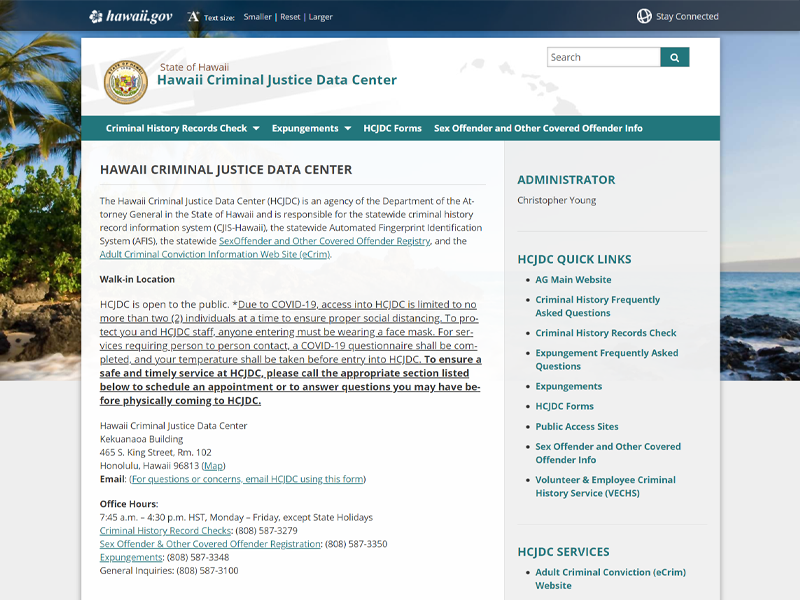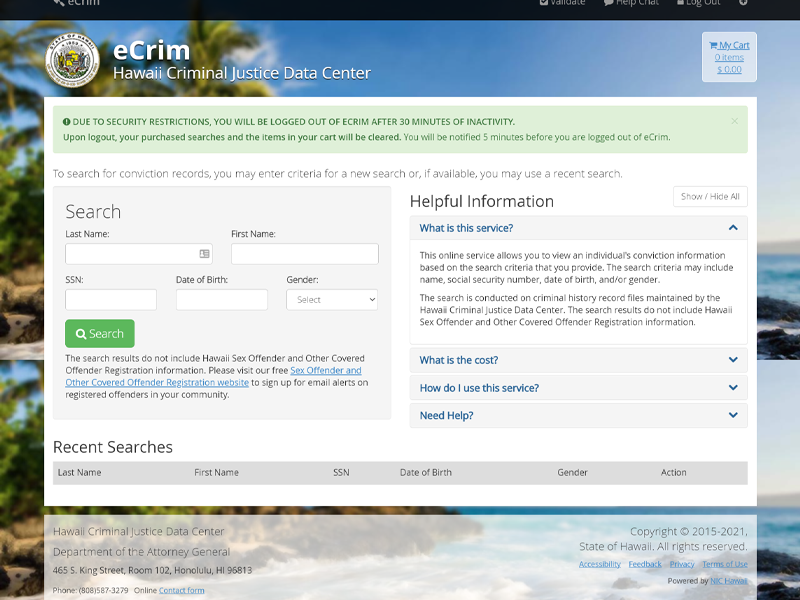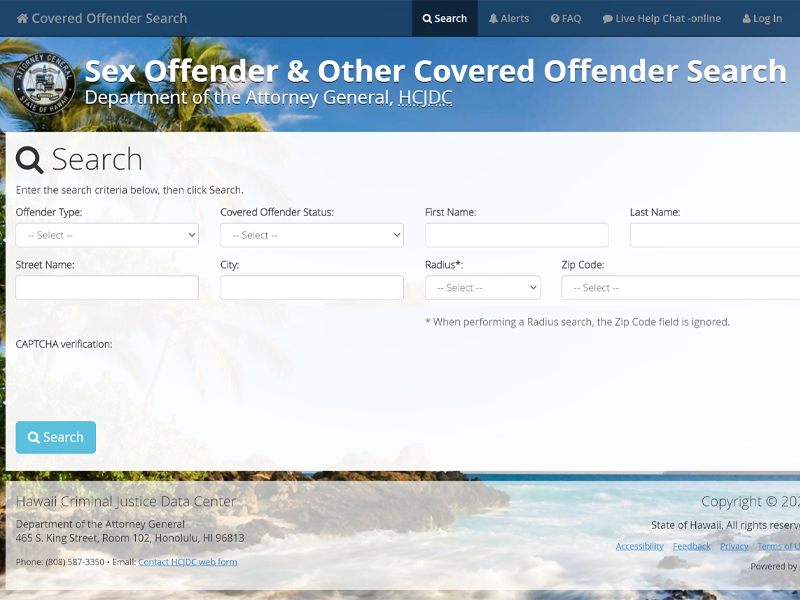Hawaii has always been a state at the forefront of protecting the personal and private information of its citizens, especially when it comes to background checks from employers.
Long recognized as one of the most are estates in America to conduct a background check in, Hawaii continues to pass new laws, new rules, and new restrictions on the background check providers all the time.
At the same time, Hawaii recognizes that it’s important for employers and other organizations (as well as individuals) to be able to do reasonable background checks on people they are thinking about hiring, working with, or inviting into their lives on a more personal basis.
To better help someone navigate the Hawaii background check process, we outlined this detailed guide below.
Hawaii Background Check 101
In 1998, Hawaii was the very first state in the US to outlaw and completely prohibit all employers from asking potential employees if they had ever been convicted of a crime.
This decision kicked off a nationwide movement, and today 33 states (and more than 150 different cities and counties across the country) have implemented the same kind of restrictions on their own background checks.
These kinds of restrictions are called “Ban the Box” restrictions and are basically put in place to help encourage employers to look beyond criminal records when hiring individuals.
Hawaii takes things another step further, however, by including laws that prohibit discriminating against potential job applicants for any criminal history information that background checks are able to pull up.
Only 14 other states have something similar, though the federal government has had legislation introduced by Hawaii lawmakers to implement this across the country, too.
Who Is Able to Run Background Checks in Hawaii?
To be able to legally conduct a background check in Hawaii, individuals need to get consent from the people that they are running a background check on.
Most of the time this consent can only be provided to employers after a conditional offer of employment has already been extended.
There are some employers that have been exempted from this law (including schools and educational organizations, businesses that provide armed security, as well as financial and insurance organizations) – but most people and most businesses will have to extend that offer of conditional employment ahead of time.
From there, employers are going to have to request approval to go through the background check process through the Hawaii Criminal Justice Data Center.
Some businesses elect to go down this road by hiring third parties to do the application and searching for them, whereas others take advantage of the tools provided by the Hawaii Criminal Justice Data Center themselves after their application has been approved.
The important thing to remember here, however, is that background checks (in-depth checks done using the criminal justice tools provided by Hawaii) are not quite as easy to run in Hawaii as they are in other states.
What Can Be Found on a Hawaii Background Check?
The information included on a Hawaii background check will be unique to each and every individual, but the kind of information that you can expect to find on a check like this will include:
- Criminal record information pertaining to arrest records, conviction records, and criminal charges wherever applicable
- The jurisdiction where that information was recorded as well as the case number and filing date
- Usually, data regarding the degree of the offense (misdemeanor or felony, for example) is outlined in these reports
- Information regarding the outcome of those cases, like whether or not a case once dismissed or moved forward
Again, Hawaii does have some restrictions placed on the kind of information that background checks can provide.
While information regarding whether or not an individual has been arrested is usually provided during a routine Hawaii background check, information regarding what that arrest was about and the conclusion of that arrest won’t always be provided.
Businesses looking for this information will first have to prove a clear and direct reason that a specific arrest would negatively impact an individual’s ability to conduct themselves at work should they be hired.
The same is true of criminal convictions.
As we highlighted earlier, Hawaii requires individuals and organizations looking to conduct more thorough background checks to first extend a conditional offer of employment before they ever have access to criminal history information.
Well, Hawaii goes another step further and will only provide a criminal conviction history stretching back 10 years – and again only if a business or organization can prove that a conviction would constitute a clear and negative impact on an individual being able to carry out their daily work duties.
By instituting the “Ban the Box” rules, Hawaii makes it impossible for businesses to deny individual employment if their criminal history does not have a rational link to the job that they are applying for.
For example, a tour bus driver with a criminal history of misdemeanor theft would not be able to be denied a position based on their criminal record alone.
At the same time, a tour bus driver with a criminal history of drunk driving would be able to have their offer of employment rescinded because of their past as a direct relation to the kind of job they are doing moving forward.
In the state of Hawaii, it is 100% legal for employers to even ask about information that has been sealed by any criminal justice organization or has otherwise been expunged. Job applicants have absolutely no legal responsibility whatsoever to disclose this kind of information, either.
Reason to Run Background Checks in Hawaii
Employers are generally looking to conduct background checks for a variety of reasons, including:
Making sure that the people they hire are of good character and good standing in the community. While past criminal behavior does not guarantee that an individual will continue to behave in such a manner, some businesses want to have a look at the past of their potential employees to get a better feel for the person they are bringing on board.
Other businesses conduct background checks to guarantee the safety and welfare of their employees, their customers, their visitors, as well as any business vendors. Looking into an individual’s past to see if they have a criminal history of violence is important to understand before bringing them on board, particularly in high-stress employment situations.
Businesses are also curious to learn if the people that they are hiring have had a history of theft. It’s critical that employers are doing everything they can to make sure that they minimize risk to their business in this department, too.
Do Hawaii Background Checks Have Limits on How Far They Go Back?
Hawaii certainly has limits and restrictions on background checks, including how far back those background checks are able to go.
For starters, state law in Hawaii says that employers cannot make employment decisions based entirely on someone’s criminal history information or credit information unless that data is specifically and directly linked to the job position an individual will be hired for.
Secondly, background checks are only going to be able to be conducted in the first place by businesses and organizations that have extended conditional offers of employment.
Thirdly, Hawaii only allows criminal background checks to be conducted on information stretching back seven years when related to felony conviction information. Misdemeanors are only able to be checked as far back as five years from the date the background check is being initiated.
There are a handful of exceptions to these rules, but they are (for the most part) the law of the land.
Is It Difficult to Run a Background Check in Hawaii?
With the passage of the “Ban the Box” law in Hawaii, this state became one of the most challenging to run background checks in for sure.
Every single employer (regardless of whether or not they have been exempted from having to offer a conditional employment opportunity) is beholden to this prohibition on denying employment based on criminal history alone.
On top of that, employers have to go through the Hawaii Criminal Justice Data Center to gain access to any of the information they are looking – and they’ll have to provide detailed, clear, and obvious reasons with a direct link to the position open the search for background information in the first place.
Antidiscrimination laws apply to all criminal background checks, and any organization that sells background data in the state of Hawaii needs to abide by FAIR Credit Reporting Act rules, regulations, and restrictions.
Most background checks also require the establishment of a “rational relationship” between the person searching for the information and the person being investigated before any data can be handed over.
At the end of the day, Hawaii certainly presents unique challenges to businesses and individuals looking to conduct background checks. These challenges aren’t insurmountable, however, and have definitely been put in place to better protect the privacy of Hawaii citizens.
How Do I Know If Third Party Background Check Companies Are Legit?
Because of the rules and regulations that dictate how background checks are conducted in Hawaii, the odds are pretty good that if a service is offering these kinds of checks they are legitimate.
Obviously, you’ll want to do a bit of research and due diligence into the third-party background check companies before you hand over any personal, private, or identifying information.
But because the penalties for breaking these background check laws in Hawaii are so stringent and severe, and because the background check process in Hawaii is so controlled and so straightforward, you just don’t see a lot of services in this industry that can’t be trusted.
Free background check services, on the other hand, are always going to be at least a little bit hit or miss.
Most of the time, the services are only ever going to be able to check public records – the same kind of records you would have been able to check all on your own.
The reason to take advantage of these solutions, though, is that they can often help you search a variety of different databases all at the same time rather than having to go from one source to another.
Will I Get My Background Check Info Back Instantly in Hawaii?
In Hawaii, you’re usually looking at background check information reported to you within 48 hours, though sometimes it takes as long as five days for your data to be collected and provided to you.
This timeline is (significantly) faster than a lot of other states in the US, but a big part of that has to do with how time-consuming it is to get approved to conduct these kinds of checks, to begin with.
As illustrated earlier, you’ll have to:
- Prove that you are a legitimate business or organization that needs to conduct background checks in the first place
- Prove that you have a rational relationship or have extended a conditional offer of employment
- Abide by all Hawaii rules, regulations, and restrictions regarding background checks
Only after all of that has been taking care of will you actually be able to go through the background check process itself. From there it’s pretty much smooth sailing!
How Much Should I Expect to Spend on Background Checks?
To have your background check taking care of, you’ll need to fill out and complete the application or a background check provided by the Hawaii Criminal Justice Data Center based out of Honolulu.
This application can be found directly on the Hawaii.gov website through the office of the Attorney General and is only going to take a couple of minutes at most to fill out from start to finish. The application itself is 100% free of charge to submit.
Following that, though, you’ll then have to actually go through the background check form itself.
This is going to require you to provide information regarding the individual you are looking up, including:
- Name
- Date of birth
- Social Security number
- Last known address
You’ll also have to provide a $30 check or money order with your application, addressing it to the State of Hawaii.
Expect this whole process to take anywhere between 48 hours and five days, though it can take between 7 and 10 days (depending entirely on how the mail in Hawaii is running at that point in time).
Are There Free Options?
There are a variety of free background check services that can be taken advantage of in Hawaii, though again most of the services deal only with public record checks.
Any service that promises to provide you with detailed criminal record information in Hawaii for free is likely not telling you the whole story.
Does Hawaii Require Background Checks for Firearms?
For starters, US federal law requires all individuals purchasing firearms from Federal Firearm License (FFL) dealers to go through a background check before ownership of the firearm is transferred.
This involves filling out a form called a 4473, a standardized form used not only in Hawaii but everywhere else throughout the United States as well. The information included on that form is then run through the National Instant Criminal Background Check System.
Hawaii also has some of the more restrictive firearm permit name rules and regulations in the United States. Anyone wishing to purchase a firearm in the state first needs to apply for a permit with the local police.
If approved (following a background check) a permit to purchase a handgun will be provided, though it expires within 10 days of issuance. A permit to purchase a long gun is going to expire one year from the date it has been issued.
The state background checks for firearm permits are very in-depth and require individual applicants to sign a waiver that authorizes full and complete disclosure of all of their mental health records. That’s on top of the criminal information available to local and state officials.
Can Driving Information in Hawaii Be Accessed?
Hawaii citizens can check their own driving record if they like, just by visiting any District Court and filling out Form 2067.
After providing identification confirming that they are the individual they want to run a driving record check on, they’ll be asked to pay a $9 fee to get the ball rolling.
These records are usually returned within three or four days.
Those looking to get the driving records of other individuals, however, will be able to do so after going through the same process – filling out the Form 2067 – but will have to pay $20 to start the process.
On top of that, a $1 fee is assessed for the first page of each court abstract and $0.50 for each following page.
These kinds of background check applications can only be filed in person at a local District Court in Hawaii, too.
Are the Hawaiian Sex Offender Records Fully Searchable?
Hawaii provides detailed information regarding individuals in their sex offender database available for anyone to inspect at any point in time, just by visiting www.sexoffenders.eHawaii.gov and using the online database tools provided there.
The information here is updated on a regular basis, though the state of Hawaii makes it clear that they cannot guarantee that the information is complete, 100% up-to-date, and totally accurate at all times.




